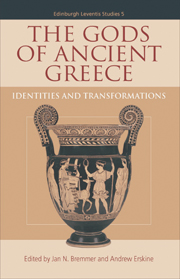Book contents
- Frontmatter
- Contents
- Preface
- List of Illustrations
- Notes on Contributors
- List of Abbreviations
- Introduction: The Greek Gods in the Twentieth Century
- 1 What is a Greek God?
- PART I SYSTEMATIC ASPECTS
- PART II INDIVIDUAL DIVINITIES AND HEROES
- 8 Zeus at Olympia
- 9 Zeus in Aeschylus: the Factor of Monetization
- 10 Hephaistos Sweats or How to Construct an Ambivalent God
- 11 Transforming Artemis: from the Goddess of the Outdoors to City Goddess
- 12 Herakles between Gods and Heroes
- 13 Identities of Gods and Heroes: Athenian Garden Sanctuaries and Gendered Rites of Passage
- PART III DIACHRONIC ASPECTS
- PART IV HISTORIOGRAPHY
- Epilogue
- Index
12 - Herakles between Gods and Heroes
from PART II - INDIVIDUAL DIVINITIES AND HEROES
Published online by Cambridge University Press: 05 August 2013
- Frontmatter
- Contents
- Preface
- List of Illustrations
- Notes on Contributors
- List of Abbreviations
- Introduction: The Greek Gods in the Twentieth Century
- 1 What is a Greek God?
- PART I SYSTEMATIC ASPECTS
- PART II INDIVIDUAL DIVINITIES AND HEROES
- 8 Zeus at Olympia
- 9 Zeus in Aeschylus: the Factor of Monetization
- 10 Hephaistos Sweats or How to Construct an Ambivalent God
- 11 Transforming Artemis: from the Goddess of the Outdoors to City Goddess
- 12 Herakles between Gods and Heroes
- 13 Identities of Gods and Heroes: Athenian Garden Sanctuaries and Gendered Rites of Passage
- PART III DIACHRONIC ASPECTS
- PART IV HISTORIOGRAPHY
- Epilogue
- Index
Summary
One way of getting at the question with which this volume begins, ‘what is a Greek god?’, is to consider figures whose divine status is in some kind of doubt. In this chapter I review the case of Herakles, whose special status as something in between a god and a hero has exercised scholars from antiquity to the present day. Most recently the debate has focused particularly on cult practice, looking at Herakles in the light of broader discussion of the traditional Olympian-chthonian opposition, and of the extent to which ritual reflects the character of its recipient. There are, however, other elements apart from ritual which need to be taken into account in an assessment of Herakles' character, and what I aim to do here is to offer an overview of the criteria by which he has been categorized on the hero-to-god scale, and to consider the extent to which such categorizations help us appreciate what Herakles actually meant to an ancient Greek worshipper.
GOD OR HERO?
To begin with it is worth going back to basics and reviewing the defining features we might look for in a Greek hero. In mythological terms we might take parentage as a starting point, and decide that Herakles' combination of a divine father and mortal mother is a good heroic qualification, on the same model as Perseus, Theseus, Achilles, Sarpedon and many others.
- Type
- Chapter
- Information
- The Gods of Ancient GreeceIdentities and Transformations, pp. 228 - 244Publisher: Edinburgh University PressPrint publication year: 2010



